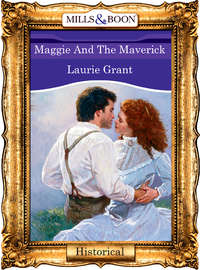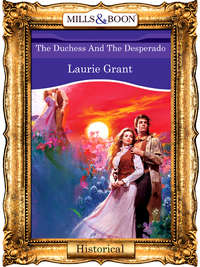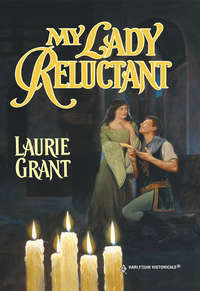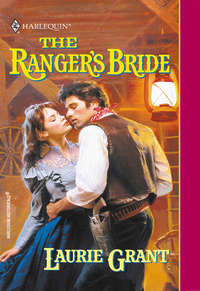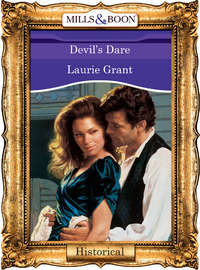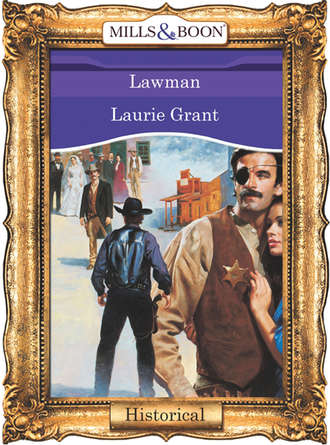
Полная версия
Lawman
Maybe he should just concentrate on the task he had set himself for the day, he decided as he got dressed. Today he was going to ride over to Gillespie Springs and thank Livy for her role in saving his life. There would be time enough tomorrow to figure out what he was going to do with the rest of his life.
All in all, he didn’t look too frightening, he decided as he took a last look in the small mirror that hung over his dressing table. The bruises had faded. He had a slight bump at the top of his nose that hadn’t been there before. His left cheek, which had been unmarked, now bore a pink slash that would in time lighten into a pale scar, but he was growing a mustache to cover the small scar over his lip. Already the mustache didn’t look halfbad, he thought. Maybe it would give Livy something to look at besides the patch over his right eye—not that it mattered. He was only going to deliver his thanks, nothing more, he reminded himself as he went downstairs and out the kitchen door, pausing to kiss Annie, who was churning butter on the porch.
“You’re goin’ to see that woman, aren’t you?” she asked with narrowed eyes.
Cal paused. “That woman?’” he repeated, raising an eyebrow at her tone. “I’m going to pay a thank-you call on Olivia Gillespie, who saved my worthless hide.”
Annie looked back down at the churn, her mouth tightening. “Well, just be careful.”
He didn’t know if she meant for him to be careful around Livy, as if she was some dangerous female who might corrupt him merely by breathing the same air, or to be careful in general, after what had happened in Bryan, and he didn’t ask.
He saddled Blue, a roan gelding. Sam had taken Goliad, his stallion, to breed a mare who had come into season late, which would help them get a jump on getting the Devlin stud farm back to its former position of prominence.
It was a pleasant hour’s ride southeast to Gillespie Springs, over rolling farmland that paralleled the Brazos River. In the spring some of these fields would be flooded for rice growing. In others, on higher ground, cotton would be grown, but now desiccated rows of the dried plants stood minus their white bolls, except for a few dirty white puffs scattered around. Cattle and horses grazed in some of the fields. A mockingbird sang from its perch in a gnarled live oak.
Reaching the little town of Gillespie Springs, which stood where the road bent to accommodate the wide red expanse of the Brazos, Cal stopped when he saw a sign on a building that said Jail. He didn’t know where else to inquire about the way to Livy’s place, and in view of recent events, he figured the sheriff would know.
He did, though the puzzled frown on his weathered old face made it clear he couldn’t understand why the decent-looking stranger in the black frock coat would want to know.
“Miz Gillespie’s place? Down there at the end a’ town, across from where the springs is,” he replied curtly to Cal’s inquiry, and then went back to the dinner he’d been eating at his desk when Cal came in.
Cal got back on Blue and rode the half mile back in the direction from which he had just come, where a stand of cottonwoods revealed the existence of the springs the town had been named for. A sign proclaimed the shady grove Gillespie Springs Park, but across the road a fence much in need of mending enclosed a white frame, two-story house with a dried-up front lawn. A windmill creaked in back next to a barn. In the pasture beyond the barn a cow bawled mournfully once or twice.
Then it was utterly quiet except for the clucking of some pullets looking for bugs among the sad-looking, wilted roses. No one answered his knock.
Perhaps she wasn’t home, but did she have no one to help her with the house or the livestock? Had the Mexican alleged to be her lover been the only employee the Gillespies had?
Could she be in the barn, gathering eggs or doing some similar chore? He walked around the side of the house.
Was the ache of regret never going to get any easier to bear? Olivia wondered, standing in the shade of the big cottonwood tree that stood in the backyard between the house and the barn. She stared down at the makeshift grave marker, which was actually a hunk of limestone she’d waded into the spring to get. Smoothed and rounded by centuries of running water, it had been as heavy as her heart felt now. Behind it, she’d lashed two sticks together to form a cross. Someone—one of his Mexican friends or relatives, she assumed—had hung a rosary on the cross and left three roses in an earthen jar. She never saw these offerings left; she assumed whoever brought them came at dawn or after dark, or during the rare times she went to the stores in town.
Francisco, you deserve better than this, she thought, feeling the familiar stinging of tears in her eyes. You deserve better than a makeshift marker and a grave in the yard of the woman whose lover they say you were. But the sheriff had had a vicious sense of humor and had insisted Francisco be buried here—”so you don’t ever forgit what you done, Miz Gillespie.”
Livy had half expected the Mexicans in the community to move Luna’s body in the dark of night to someplace else—to one of their yards over on North Street, perhaps, for there was no Catholic church in Gillespie Springs. But maybe they felt Francisco had already suffered enough, for the grave had not been disturbed.
Rest in peace, Francisco. You know and I know it was all a lie.
Something—a rustling in the grass, a snapping of some tiny twig—warned her she was no longer alone.
She whirled, already wondering what she could use for a weapon, for she hadn’t had one the last time she’d been taken by surprise.
The man standing at the edge of the tree’s shade was a stranger to her, yet not a stranger—tall and lean, his hair streaked with gray, a patch over his right eye. It was the latter detail that caused the hand that had curved instinctively over her abdomen to relax.
“Cal?” she breathed. “What are you doing here? Are you…are you all right?” she asked, remembering the day she’d seen him in Bryan, beaten senseless to within an inch of his life. “You—you’re growing a mustache…” she babbled, as he came closer.
He smoothed long fingers over it self-consciously. “Yeah, I thought it might cover up one of my new scars, at least. But I’ve mended, thanks to you. Sam told me what you did that day, and I—I just came to thank you. I reckon I might be singin’ with the angels now—or worse—if you hadn’t shot off that gun.”
“I—I didn’t even know who you were when I stepped forward,” she said, staring at him, seeing a new scar on his cheek. Even in the shadows she could see the faint discoloration that remained around his left eye.
“Or you wouldn’t have helped me?” His mouth curved into an ironic smile, a smile that transformed the scarred face into one that still had the power to make her heart pound.
“No! Yes! I meant I…well, I would have helped anyone in your position,” she said, feeling flustered. “I— I just didn’t find out it was you until one of those rowdies said you deserved it because of fighting for the Yankees,” she added, but when she saw his face cloud over at the mention of the war, she wished she could unsay it.
“And what do you say, Livy?” he asked, in that husky drawl that had always wreaked havoc with her resistance. “Are you still mad at me for wearing blue?”
No. Livy wanted to say. Oh, no. Cal. I’ve had thousands of hours to regret not telling you to do what you had to do, then return to me safely. She heard the unspoken question in the tone of his voice, saw in his face his desire to recapture what they once had. She had but to say the right words and he would reach out and they would begin to bridge the enormous gap between them.
“Cal,” Livy began, “it was a long time ago. Years. A lot has happened,” she said, and was about to ask if he still wanted to be her friend in spite of what was being said about her when his eye fell on what lay behind her.
She saw when he grasped the fact that she was standing in front of a grave, then noticed his gaze narrow and realized he must have glimpsed the roses.
“Your husband?” he asked, staring at her. “They buried Daniel Gillespie here?”
“No, it’s not Dan,” she said. “Dan’s buried in the cemetery next to the church, at the other end of town. No, that’s…it’s Francisco Luna.” She saw his confusion. “He’s—he’s the one Dan killed…before he killed himself.”
The puzzled expression was transformed into one of understanding, and then he frowned. “Livy, you had him buried here? You put flowers on his grave? Then— then it’s true, isn’t it?”
She saw him take an involuntary step back, even as her brain screamed with disappointment. Then it’s true he was your lover—that’s what Cal meant. And then her disappointment changed to anger, anger that he was just like everyone else in Gillespie Springs who had judged her based on what was said, without giving her a chance to defend herself.
He added, “But…was that wise? After what happened?”
Livy saw his gaze shift to her belly, and knew that he’d seen the slight thickening there. She crossed her arms protectively over her abdomen in that age-old, unconscious gesture of a pregnant woman, feeling the anger rise and surround her like flames.
“You think what you want to think, Caleb Devlin, it doesn’t make any difference to me. And yes, I am still angry at you, you—you traitor! One of my brothers was killed, and the other one never bothered to come home. My husband came back a broken, bitter shell of a man. Daddy died of a broken heart when we couldn’t pay the taxes on the plantation. And you think I shouldn’t be angry at you? And what business is it of yours if I gave six feet of earth in my own yard to Francisco Luna?”
She watched as a muscle worked in Cal’s jaw. “Livy, I’m sorry. You’re right, it’s none of my business. I was just—”
“I don’t want to hear it,” she told him. “I’d have thought after your beating you’d have a little compassion for other outcasts, but as that doesn’t appear to be the case, you can just get out of here!”
“Livy, please—”
“No! Get out!
But he just stood there, and with a little cry, she ran for the house, slamming the door. She headed for the stairs, intending to run up to the sanctuary of her room, where she could give in to the tears that threatened to overwhelm her, safe from his probing gaze.
She had reached the second-to-last step when she slipped.
Even outside, he heard her scream, and with the scream, the curious paralysis that had made him stand there while she denounced him vanished. In a few short strides he’d reached the door and wrenched it open. Thank God she hadn’t taken time to lock it.
“Olivia?” he called, striding into the kitchen. “Where are you?” And then he almost stepped on her, lying in a crumpled heap at the bottom of the stairs that led up from the kitchen.
“Olivia?”
She lay on her side, her knees drawn up against her abdomen, her skirts twisted around her ankles. Her eyes were closed, her face pasty white, like a poorly bleached muslin sheet. Moisture beaded her upper lip.
Her eyelids fluttered at the sound of his voice, then opened. She blinked once, twice, as if trying to focus.
“Olivia, it’s me, Cal,” he said, kneeling at her side. “What’s happened to you? Did you fall?”
Her eyes drifted shut again. “I guess so…” she murmured. “Slipped…”
“Can you get back up? Does anything seem like it’s broken?” he asked, feeling the delicate bones of her wrists and wondering if she even realized who he was.
“Can’t… Dizzy, bleeding…” she said, and then some spasm seemed to seize her and she clutched her abdomen and moaned.
Cal hadn’t seen the blood at first because of the black widow’s weeds she was wearing, but as he started to scoop her up off the floor he felt the warm dampness on the back of her skirts and saw the crimson stain of blood on his forearm.
“Olivia! What’s happening? Are you—are you…” How did one delicately ask a lady if she were losing the baby he wasn’t supposed to acknowledge she was carrying?
Her eyelids fluttered open and she gazed at his face as if puzzled for a few seconds. “Yes…I’m miscarrying. And do you know what? I’m…glad….”
Her announcement stunned him. “You’re miscarrying? Lord God, Livy, you need a doctor! I’ll get him— where is he?”
“Right in town…next to the bank. But he won’t come…hates me, too…”
“I don’t care. You need help, so he’s going to have to see you,” he told her, but then realized she couldn’t hear him, for she had passed out.
For a moment he considered what he should do. Livy’s pulse was rapid, faint, and her skin felt cool and clammy. The port-wine flood beneath her was growing. He thought about riding hell-for-leather back down the road to the doctor’s, but did he dare leave her for so long while he went to persuade some stiff-necked hypocrite to do his medical duty? Deciding the answer was no, he strode back down the hall, grabbed an afghan he’d seen folded up on the back of a horsehair sofa and wrapped it around Livy, then lifted her and carried her to where Blue stood tied under a tree.
Galloping back into town with her cradled in his arms, he found the bank at the center of town and the doctor’s office in the building that stood just next to it, as Livy had said.
The chairs in the small waiting room were fully occupied by a woman and her handful of children, all of whom gaped at the sight of the stranger who strode in carrying the town’s most notorious female.
“Mama! That man’s got a patch on his eye like a pirate, and the lady’s bleedin’!” one boy cried. He pointed at the trail of blood behind Cal, causing his mother to gasp and pull him against her ample bosom.
“The doctor—where is he?” Cal demanded curtly, when it seemed the woman was only going to stare in horror.
She pointed to the door at the other end of the waiting room. “In there. But you’ll have to wait, just like we are. He—he has a patient—”
Cal didn’t wait. He strode over to the door and called through it, “Doc, I got a sick woman here—she needs help now.”
“Be with you in a few minutes,” a raspy voice answered in a disinterested fashion.
That wasn’t going to be good enough. Cal steadied his unconscious burden, then kicked the door open, surprising the elderly sawbones and his “patient,” another elderly gent who sat opposite the doctor across the examining table, on which lay a checkerboard and checkers.
Cal kicked the game off the table, sending the wooden disks flying.
“Now wait just a minute, stranger. You can’t—” began the doctor, putting down a bottle of whiskey.
“This woman needs your help now,” he told the astonished sawbones as he laid Livy gently down on the now-empty examining table. “I think she’s losing her baby.”
Recovering his professional poise, the doctor bustled over to his patient, while the other old man continued to stare with undisguised curiosity.
“But that’s Miz Gillespie!” the doctor said in consternation after he saw her face. He seemed to freeze in place.
“You got a problem with her name, Doc?” snapped Cal, allowing his hand to hover suggestively near the gun on his hip. “Seems to me it doesn’t matter who she is right now, just that she needs your help. And I’ll pay your fee, if that’s the problem.”
The doctor stared at the gun, then back at Cal’s face. “I guess you’re right, Mr.—?”
“Caleb Devlin.”
“Mr. Devlin. Very well, then, I’ll see what’s to be done. Hap, we’ll finish our, uh, business later,” he said to the other old man. “Why don’t you show Mr. Devlin back out to the waiting room?”
“I don’t think—” began Cal.
But the doctor was very much in command now. “Go on, you can’t wait in here, even if you was this woman’s husband, which I believe you ain’t. Go on out to the waiting room. And you tell that Ginny Petree an’ her endless brood a brats with sore throats that it’s gonna be awhile.”
Chapter Four
Cal retreated, but he knew he wasn’t going to be able to remain in the tiny waiting room with half a dozen children studying his eye patch while their mama stared pointedly at the dried blood on his arm and the dark red splotches on the floor. He went on outside and stood stroking Blue’s nose at the hitching post, wishing there was something he could do while he waited.
As if in answer, a shot rang out inside the bank building next door, and a heartbeat later, a woman screamed. Then her screams blended with shouting, just as three masked men dashed out of the bank, one of them carrying an obviously full, heavy gunnysack.
Even as Cal tensed to respond, the sheriff came running out of his office opposite the bank, drawing his gun. He aimed, fired, and one of the bandits, the one carrying the gunnysack, went down with a hoarse cry. But then one of his partners fired, even as the other one snatched up the gunnysack, and Cal saw the weathered old face of the sheriff go rigid with agony as he clutched his chest and fell, measuring his length in the dusty street.
Everyone else who had been on the street had taken cover, Cal noted as he took aim over the withers of his horse. Good, then his shot wouldn’t be apt to hit an innocent person. He fired, and his shot dropped the man who had gunned down the sheriff.
Cal hadn’t shot at a man since the first half of the war, but evidently his practice had paid off, he thought grimly as the outlaw fell.
Now the only one alive, the third bandit looked wildly in Cal’s direction before yanking his mount’s reins from the hitching post. He aimed a wild shot that whistled harmlessly past Cal, then vaulted into the saddle, still clutching the gunnysack by its drawstrings, and spurred his horse. “Hyaaah! Giddap!”
The world narrowed to the back of that fleeing outlaw as Cal took aim again. He fired as the horse hit a full gallop, and saw the bloody hole appear in the outlaw’s upper back. The man’s arms flailed wide, dropping the gunnysack. Coins spilled out the loose top and into the dirt. Boneless as a rag doll, the man fell from the saddle, landing with a thud. The horse galloped on.
In the momentary silence that followed, punctuated only by the pounding hoofbeats, Cal was barely aware of the faces plastered at every window as he holstered his gun. It was over. The outlaws were all dead.
A moment later there was an explosion of noise as people shoved and elbowed their way out of the bank, the general store, the saloon and into the street, hollering back and forth to one another about what had just taken place. A couple of men went to the fallen sheriff, turned him gently over, and when they saw there was nothing to be done, closed his eyes. They did likewise for the bandits who had died just outside the bank. But the rest of the townspeople started to clap and cheer.
“That was some shooting, mister!” someone cried ‘ out.
“He can see to shoot better with just one eye than most men can with both a theirs!” Cal heard an excited youth say. The boy ran the few yards to the body of the bandit who had fallen from his horse.
He turned the man over with his foot. “He’s dead, all right! Shot right through the heart!” he called. He ran a few feet back and snatched up the bag, stuffing in the coins that had spilled out. “An’ here’s the money, all safe an sound!”
Cal ignored the praise. Oh, he’d done the right thing. But he had killed two men in little more than the time it had taken to blink twice, and even though one of them had murdered the sheriff, he couldn’t rejoice in the fact that he had taken two human lives. He felt sick inside. He wanted to flee from the sight of the exultant faces he saw around him; he even turned to mount Blue, forgetting all about Livy being inside the doctor’s office. But as he was loosening the gelding’s reins, someone clapped him on the back.
“That was quick thinking, mister, and excellent shooting, like the boy said.”
Cal turned, intending to tell whoever it was to just leave him the hell alone, but before he could get the words out, the prosperously dressed man wearing a handlebar mustache extended his hand.
“James Long, mayor of Gillespie Springs. I’m also the owner of the hotel.” He beamed at Cal.
In spite of himself, Cal found himself returning the handshake, though he couldn’t return his smile. “Cal Devlin.”
“Well, Mr. Devlin, you have the town’s thanks for your quick actions, which saved their hard-earned funds on deposit in the bank.”
“Too bad I wasn’t fast enough to save the sheriff,” Cal muttered. “Now, if you’ll excuse me—”
“All in good time, sir,” Long persisted, keeping a hand on Cal’s arm. “As you pointed out, the town has been tragically deprived of its peace officer. And I’m repeating myself, but I’m impressed with your quick action and accurate shooting. Might you be interested in the job?”
“I’m no lawman, I’m a minister,” Cal replied.
“Oh?” Long was surprised, of course. “And where is your pulpit, if I may ask?”
“Well…” Cal hesitated, not knowing if the man had heard of the notorious minister in Bryan who had fought for the Union. While he wasn’t exactly reveling in the mayor’s praise, he didn’t want that praise to turn to disgust, either. “I guess you could say I’m not exactly employed as a man of the cloth right now. But—”
“Doing anything else you can’t leave?” interrupted another well-dressed gentleman, who had just joined the mustachioed mayor.
“No, I can’t honestly say that I am.”
“Mr. Devlin, this here is Mr. Robert Gillespie, the bank president,” Long informed him, and the stocky man extended his hand.
So this was the brother of Livy’s late husband, the man who coveted the small farm left to Livy. He wasn’t at all thin, but somehow Cal had the impression that if Robert Gillespie had been an animal, he’d have been a weasel. Maybe it was the utter coldness of his gray eyes.
“Well, Mr. Devlin, I can only add my urgings,” Gillespie said in a rich, cultured voice. “We have a preacher here in Gillespie Springs, and we had a sheriff, but God rest Olin Watts’s soul, we don’t have a sheriff anymore.”
“Now the way I see it,” Long added in his earnest manner, “bein’ a lawman is just as much servin’ the Lord an’ your fellow man as bein’ a minister is. In both jobs, you stand up for what’s right, am I correct?”
Cal couldn’t argue with that. “I reckon so. But surely there’s a better choice than a one-eyed man,” he said, with a gesture toward his eye patch.
Long’s gaze went to the bodies of the three dead bandits, and then he lifted an eyebrow. “Those fellows wouldn’t agree with you, I think.”
“But—”
“By the power vested in me as mayor, I’m offerin’ you the job, son.”
“And I concur,” added Robert Gillespie.
“But you don’t know anything about me. I could be a murderer or a thief myself,” Cal protested. Or a man who served with the Yankees. He particularly wondered if Gillespie would be so hearty in his urgings if he knew that Cal had just aided his sister-in-law. And then he remembered Livy, whom he had left bleeding in the doctor’s office, and suddenly he was anxious to be done with this interview and see about her.
“I don’t have to know anything,” Long insisted. “What I saw was a man who didn’t have any reason to mix himself up in our troubles—you didn’t know the sheriff, you didn’t have any money in this bank, but you did the right thing anyway. In my book that makes you the right man for the job. Say you’ll at least give it a try. You get your quarters above the sheriffs office gratis of course, free dinner every day from the saloon, supper from the hotel, and forty dollars a month, too. It’s a good deal, I’d say.”
Forty dollars a month—not much more than what the average ranch hand earned. Cal eyed the townspeople, who were staring back at him, some smiling, some solemn—but in none of the faces did he see the hatred he had seen in the faces of the folks in Bryan. Of course, none of these people knew what color his uniform had been in the war, or that he had spent the last half of that war fighting for neither side. They might not be so quick to grin at him if they knew.


